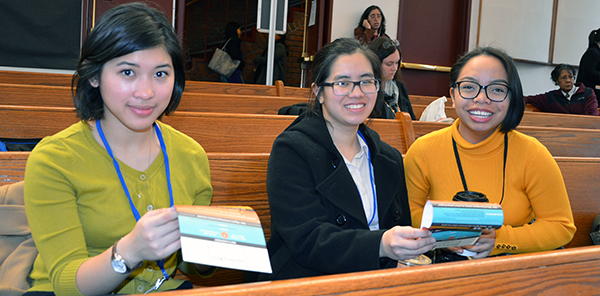UN-CSW 2017 | A Deeper Understanding | Countering Xenophobia | Focus on Water | Day of Happiness | NDMU at CSW | Modeling Inclusiveness | Empowered to Lead | Striking a Chord | Preparing for Advocacy

From left, Notre Dame of Maryland University students Micah Castelo, Tran Ann Bui and Gerriza Balmes read over the infographic on “Debunking Myths to End Xenophobia.” Micah and Gerriza are from the Philippines, and Ann is from Viet Nam.
March 22, 2017
A United Nations Commission on the Status of Women panel on xenophobia and migrants proved to be particularly relevant to the School Sisters of Notre Dame delegation, which includes college students whose families come from Nigeria, the Philippines, Viet Nam and Nepal.
“Countering Xenophobia: The Social and Economic Contribution of Migrant Women” addressed ways in which xenophobia inhibits the integration of migrant women into the workplace and community and how it contributes to women’s unemployment and social and economic marginalization in host countries.
Gerriza Balmes, a Notre Dame of Maryland University student, whose mother brought her family to the United States from the Philippines, said her mother was a nurse who encountered discrimination in the workforce because of her background.
“This is really important to me as a first generation migrant myself,” Gerriza said. (Watch Gerriza’s interview here.)
There is a rise of xenophobia – fear of the stranger – and a rise of right wing populism around the world, said Moderator Eva Richter, a member of the NGO Committee on Migration.
“The way to counter it is social inclusion, leaving nobody behind, like the SDGS want to accomplish” Richter said. “Getting to know people, getting them to be part of the community is absolutely essential to countering xenophobia.”
Marta Roig, senior social affairs officer for the United Nations Department of Economic and Social Affairs, said that there is growing and overwhelming evidence that migrants provide positive contributions to the countries they leave (for example, by sending back remittances to family members) and to the countries where they come. Migrants’ contributions would be larger if they were not disadvantaged by policy and society.
As part of the presentation, the NGO Committee on Migration launched their infographic “Debunking Myths to End Xenophobia.” Among the points that they make:
Myth: Migrants are hurting my country’s economy.
In most countries, migrants contribute more in taxes and social contributions than they receive in benefits. Typically, immigrants will pay a net $80,000 more in taxes during their lifetimes than they collect in government services in the United States
Myth: Migrants are taking jobs away from citizens who need them.
Migrants’ skills and abilities supplement the human capital of the labor market. In the United States, the evidence shows that skilled immigrants contribute to boosting research and innovation, as well as technological progress, which leads to more jobs.
Myth: Keeping migrants away will ensure safety in my country.
Non-citizens account for only 5 percent of the U.S. prison population. Being the victim of a terrorist attack committed by a refugee in the United States is 1 in 3.6 billion, but being struck by lightning in your lifetime in the United States is 1 in 13 thousand.
The infographic notes that more than half of the world’s refugees are children and that “UNICEF says that Syria is one of the most dangerous places to be a child – right now, children in Syria are at a high risk of starvation, torture, arrest, sexual abuse, abduction, early marriage, recruitment by armed groups and death. In 2016, in Afghanistan more than 3,500 children were killed or injured in violence. The conflict has also disrupted access to health care and education.”
The NGO Committee on Migration recommends sharing information to break prejudicial myths; exercising acts of solidarity in communities, schools and work and being inclusive; and listening to voices of migrants and refugees so that decisions can be based on facts.
